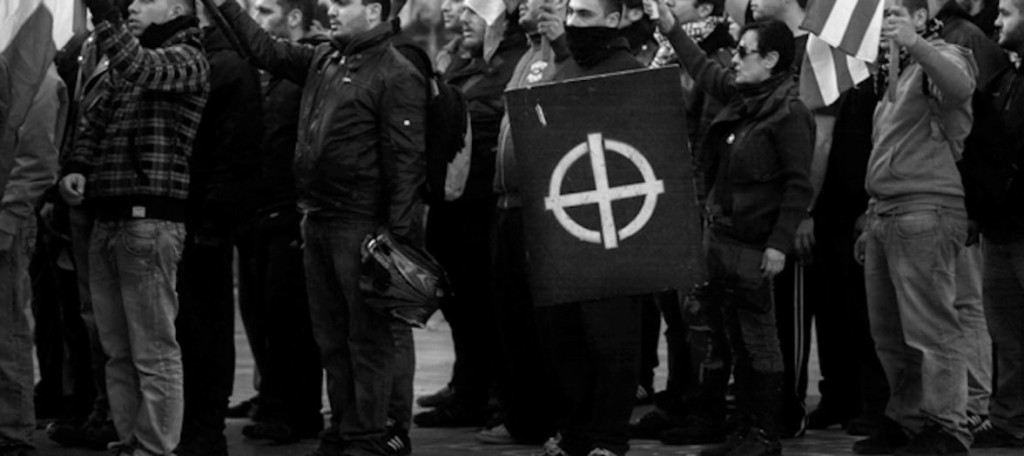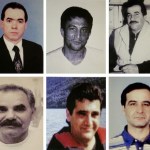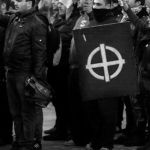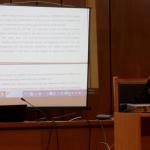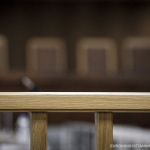Source: lareviewofbooks.org

RIGHT NOW, Greeks who say Adolf Hitler was a “great personality, like [Joseph] Stalin,” and an American who thinks Benito Mussolini is quotable are politicking in the halls of power. From the streets of Athens to Charlottesville, their sinister references are alive and mercilessly kicking, as their followers chant about blood, honor, and soil.
Take heed.
I. The European Example
In September 2015, Golden Dawn — “one of Europe’s most violent far-right parties” — placed third in Greece’s general election, reinforcing the parliamentary presence it had won in 2012 under the anti-immigrant slogan: “So we can rid this land of filth.” Polls revealed that nearly 17 percent of the country’s 25 percent unemployed population — mired in the sixth year of “the deepest recession ever witnessed by a developed economy” — had opted for Golden Dawn at the ballot boxes. What’s more, the party’s popularity increased twofold on some of the Greek islands, where many hundreds of thousands of people — refugees young and old, mostly from Syria, Afghanistan, and Iraq — would emerge via smuggler boats by the end of the year.
Against that splintering backdrop, an 1,109-page decree already detailed the alleged crimes committed by Golden Dawn officials and members since 2008. A trial of 69 suspects, including the party’s entire parliamentary group from the 2012 elections, was also underway and continues today. The Golden Dawners, who face charges ranging from participation in a criminal gang to illegal weapons possession, money laundering, human trafficking, aggravated assault, and murder, claim they are victims of a conspiracy and political persecution. But in the eyes of a member of the prosecution, the alleged gang is embroiled in “the biggest trial of fascist criminality since Nuremberg.”

During the September 2013 raid on the home of Golden Dawn’s Sieg-Heiling leader Nikolaos Michaloliakos, police discovered a portrait of Hitler, three unregistered firearms, and wads of tens of thousands of euros. “I am not a Nazi,” then-55-year-old Michaloliakos fulminated after his arrest on suspicion of using the party to run a criminal gang. Rather, he is simply a Greek nationalist with “youthful indiscretions,” or so he claims.
In the 1970s, Michaloliakos was apprehended for such offenses as assaulting journalists at the funeral of one of the military junta’s arch-torturers and illegal possession of guns and explosives. The Greek dictator, Nazi collaborator, and CIA recruit Georgios Papadopoulos — a hero and former fellow inmate of Michaloliakos — is said to have coached the young fascist behind bars. By the 1980s, Michaloliakos launched the magazine Golden Dawn, battle crying in print: “We are the faithful soldiers of the National Socialist idea and nothing else.” He founded a fringe group of the same name in 1985 and registered it as a political party less than a decade later. In 2010, his party, whose official slogan, “Blood, Honor, Golden Dawn,” is based on the Hitler Youth’s own “Blut und Ehre,” won a seat on the Athens City Council. And two years later, with the “superiority of the white race and the Greek nation” as their general truth, Golden Dawn secured enough votes to enter the national parliament.
The Greek constitution forbids the banning of political parties — unless one is proven to be, let’s say, a criminal gang in disguise. Accordingly, the trial of Golden Dawn suspects inches toward its third year, while Michaloliakos’s so-called “political movement of the people” represents a spiraling global threat.
After electoral defeats in France and the Netherlands last year, Europe’s far right found a rallying point in Golden Dawn — a barometer of undisguised fascism and, as it turns out, of rightward winds roiling American politics. For a case in point, we need look no further than Matthew Heimbach, the Indiana-based co-founder of the extremist Traditionalist Worker Party. Last August, at the “Unite the Right” rally in Charlottesville, Virginia, the 26-year-old white nationalist marched alongside hundreds of far-rightists including armed neo-Nazis and the Ku Klux Klan. “Blood and soil,” they chanted, borrowing the Nazi slogan “Blut und Boden.” There, in the street, he told VICE News Tonight that his American ilk follows “the European example of Golden Dawn.”
In fall 2014, Heimbach rubbed shoulders with some of Michaloliakos’s “faithful soldiers” at an event hosted by Golden Dawn New York. “Hail Golden Dawn,” the American supremacist later saluted his Greek allies in an online diary entry. “While the globalists, especially the European Union, have been looting Greece financially for years, the ruling mainstream political parties have done nothing to stand up for the best interests of the Greek people,” he argued. “Golden Dawn has risen as a political movement of the people to fulfill the needs of the people […] As Greeks starve, the mainstream parties promote cutting wages and pensions to the bone while bringing in hordes of new immigrants from the Third World.”
Like the United States’s far right, Golden Dawn thrives on a victimhood narrative complete with violent visions of national purity, now augmented by the bloodstained spectacle of Donald Trump’s White House. The United States, where “wealth inequality is higher than ever,” and Greece, where unemployment is the highest in the eurozone, demonstrate how economic anxiety gets intricately interwoven with xenophobic nationalism. A duplicitous advisory of sorts is in effect wherever the far right has gained some direct or indirect political influence: Take heed of the coming boats and planes full of Third World invaders who will corrupt the purity of the First World nation — or, at the very least, steal more jobs and more taxpayer dollars.
II. Killed by Nazis
Last October, in Athens, I met a middle-aged leftist and self-described “solidarian” named Marcos (pseudonym), who had volunteered on the Greek island of Lesvos amid Europe’s worst refugee crisis since World War II. I asked him to remark on the trial of Golden Dawn — or “the Nazi party in parliament,” as it is known by its critics. In response, the solidarian recited a piece of graffiti from his city’s streets, one that references the number of Greeks who once cast ballots in favor of Golden Dawn: “There are 500,000 fingerprints on the knife that killed Pavlos Fyssas.”
Late one September night in 2013, Fyssas, the 34-year-old anti-fascist activist and rapper known as MC Killah P (“Killer of the Past”), was stabbed to death in the streets of Piraeus. In public view and the presence of police, a crowd of thugs wearing Golden Dawn shirts and military-style trousers encircled Fyssas before their knife-wielding accomplice arrived on the scene. Shortly thereafter, a 45-year-old self-professed Golden Dawner named Giorgos Roupakias was arrested and claimed responsibility for the murder. Michaloliakos’s party denied any involvement: “[The accusers] are miserable and wretched not only because of their brazen lies and slander, but because they are exploiting a tragic event for politicking, to win votes and to divide Greek society,” their statement read. The following week, a handful of top Golden Dawn officials, plus multiple members, were arrested. Among them was Michaloliakos, who became the first elected political head to be jailed in Greece since the fall of his hero’s junta in 1974.
Ahead of the September 2015 elections, Michaloliakos, who had been released from prison earlier in the year after serving the pretrial maximum of 18 months, told a live radio show that Golden Dawn accepts political responsibility for the murder of Fyssas. “As for criminal liability, there isn’t any,” he continued, adding, “Is it right to condemn a whole party because one of its followers carried out a condemnable act?” The prosecution, however, argues that the murder was a “coordinated assassination” by one of Golden Dawn’s “battalion squads,” which are said to be the party’s “beating heart,” targeting immigrants, refugees, leftists, communists, journalists, LGBTQ+ people, trade unionists, the prosecution itself, and anyone else who might oppose them.
This past September, subsequent to the fourth anniversary of Fyssas’s assassination, the Greek initiative Jail Golden Dawn published a disturbing montage that features footage of torch-bearing far-rightists chanting in the streets of Charlottesville and Golden Dawners doing the same in Greece, complete with analogous scenes of firearms being proudly clasped and punches being fiercely thrown. Following that, we see the face of Heather Heyer, the 32-year-old anti-racist activist and Charlottesville paralegal who was killed when a 20-year-old white nationalist named James Alex Fields Jr. rammed his car at high speed into a crowd of counter-protesters during the “Unite the Right” rally. A snapshot of Fyssas rapping on stage fades in, leading a portrait of Shehzad Luqman, the 27-year-old Pakistani immigrant who was stabbed to death by a pair of Golden Dawn–affiliated fascists in January 2013 as he rode his bicycle to work through the streets of Athens. The final scene reads in white text on an otherwise blank screen, “Killed by Nazis.”
Jail Golden Dawn has vividly captured the threat of an interconnected fascist movement. Following the results of the United States’s 2016 election, Golden Dawn hailed the 71-year-old celebrity business magnate’s win — or, “historic upset” — as one for “the forces which oppose globalization, are fighting illegal migration, and are in favor of clean ethnic states,” proclaiming that “a great global change is starting, which will continue with nationalists prevailing in Austria, Marine Le Pen in France and Golden Dawn in Greece.” Today, they could celebrate last November’s “great march of patriots” in Warsaw, where an estimated 60,000 people marched under the banner of “White Europe,” as well as the example of the anti-immigrant Alternative for Germany (AfD), which this past September became the first far-right party to enter the Bundestag since the 1950s.

In late January 2017, following Trump’s Inaugural Address, hundreds of Golden Dawners marched through the streets of Athens, torches in hand. Unsurprisingly, POTUS 45’s “America First” theme — with its historical links to prominent Americans including anti-Semites and Nazi sympathizers — drew praise from Golden Dawn, who envisions a “Greece for the Greeks” and has spearheaded “Greek only” blood banks. Ilias Panagiotaros, who is one of the Golden Dawn parliamentarians on trial, applauded Trump’s proposed Muslim ban. “His policies have given [Golden Dawn] a new wind of support,” Panagiotaros said, adding, “It’s validating and reinforcing our nationalistic and patriotic policies — policies that we have been advocating for years.”
The Nazi symbolism shared by Golden Dawn and Trump’s base would seem satirically kitsch, if it weren’t so powerful. For another case in point, the recent documentary “A Night at the Garden” presents us with archival footage of the 1939 rally of some 20,000 Americans in New York’s Madison Square Garden to celebrate the dawn of Nazism. Facing a colossal portrait of George Washington, scores of them extended their right arms in the Nazi salute. That historic affair is a glaring harbinger of, say, a menacing contemporary force like Richard B. Spencer, the 39-year-old white supremacist Trump supporter who coined the term “alt-right” almost a decade ago. In fall 2016, at the National Policy Institute’s annual conference — an event, held in the United States’s capital, that “endeavor[ed] to do the impossible: give voice to the interests of white peoples” — Spencer roared: “Hail Trump, hail our people, hail victory!” His 200-strong audience cheered while some gave the Sieg Heil of approval. The Southern Poverty Law Center describes Spencer as “one of [America’s] most successful young white nationalist leaders — a suit-and-tie version of the white supremacists of old.” In sum: Same rhetoric, different decade.
III. Not Guilty as Charged
With respect to the Golden Dawn trial, the example of the German Nazi party leaders in the aftermath of World War II has been observed. “In [the Nuremberg trials],” writes the Greek investigative journalist Dimitris Psarras in his 2015 booklet Golden Dawn on Trial, “most of Hitler’s associates responded to all accusations with the same formula ‘not guilty as charged.’ […] In other words, they did not deny having committed the act, but rather tried to situate it within their own value system, in which context it was not a criminal act.”
Since day one, the Athens-based initiative Golden Dawn Watch (GDW) has been monitoring this “Greek Nuremberg,” and their online archive for the proceedings currently holds at least 205 summary reports. Below are three excerpts from the archive, each one annotated by Marios Lolos, who testified as a witness for the prosecution and has been a conflict photographer for 27 years, as well as Kostis Papaioannou, who monitors the trial with GDW and has been a human rights defender for three decades. Think of each excerpt as part of a fascism advisory in effect on both sides of the Atlantic.
A. “Concerned Citizens” Stood Next to Riot Police
Day 167 of the trial, Athens, June 2017. The testimony of witness Marios Lolos, president of the Union of Press Photographers of Greece (full report):
The witness stated that Golden Dawn holds a military view, which he hasn’t seen in any other political party, saying that the only harassment he has witnessed is by Golden Dawn and riot police units. As he said, he has gone to photograph conflicts in war zones and the place he almost got killed was Syntagma Square [in Athens]. He referred to another incident, a few hours after the murder of [Pavlos] Fyssas in Keratsini, when “concerned citizens” stood next to the riot police units and were throwing stones. From the slogans they used he surmised they were members of Golden Dawn.
“Golden Dawn and the police speak the same language of violence,” Lolos tells me, adding that countless numbers of his fellow photojournalists have either been beaten or documented the beatings of their colleagues by both forces. The longtime photojournalist, who has covered combat in Bosnia, Kosovo, and the Gaza Strip, motions for my hand. I touch the inch-deep crater near the crown of his skull. “It was as if my camera was a Molotov cocktail,” he sighed, before recounting the April 2012 demonstration in Syntagma Square when a riot police officer charged at him, baton upraised and flipped upside down so that the metal handle would strike instead of the rubber. He filed a police report following the life-threatening assault, but it never saw the light of day.
Like Lolos, Kostis Papaioannou, who is former chairman of Amnesty International’s Greek office and general secretary for Transparency and Human Rights, cites a “pattern of impunity” in the Greek police force (who, it’s important to note, have shown massive electoral support for Golden Dawn). “We have strong indication of collaboration between several police units and Golden Dawn members in the streets,” Papaioannou says, referring to the findings of the Racist Violence Recording Network (RVRN), the independent initiative that he co-founded in 2013. An investigation by Amnesty International, entitled “A Law Unto Themselves,” found the same. “The Golden Dawn debacle is only the tip of the iceberg,” the 2014 report reads, “Entrenched racism, excessive use of force and deep-rooted impunity are a blight on the Greek police. Successive Greek governments have so far failed to acknowledge, let alone tackle, these human rights violations by police and on-going impunity.”

B. Entry to Parliament Did Not Diminish Activity
Day 164, Athens, June 2017. The testimony of witness Athanasios Kourkoulas, a member of the movement “Deport Racism” (full report):
According to the witness the criminal activity of Golden Dawn can be shown by its organized goal of hurting people, by its racist motives that aim to intimidate, “by the violent evacuation of every square, every social space. With the creation of ‘clean zones.’” The witness added that Golden Dawn has a history of such activities, as can be shown that even in the ’80s a lot of attacks had taken place, and that “Their entry to parliament did not diminish their activity, on the contrary it increased it.”
“We may sometimes raise our hand this way,” said Michaloliakos, gesturing the Sieg Heil for his 2,000-strong audience during a Golden Dawn rally in 2012. “But these hands are clean, not dirty. They haven’t stolen.” Papaioannou, who published the 2013 book The Clean Hands of Golden Dawn, hotly contests:
They’re not just far-right. Their origins are back in the main ideas of National Socialism. And when they entered parliament, they made little effort to cover up their direct reflection of German Nazism — except that they use double rhetoric, publicly referring to themselves as “Greek nationalists.”
Papaioannou points out that Golden Dawn’s electoral successes had given them access to public funds as well as media spotlight; in turn, their dangerous platform gained some unsettling outward legitimacy. “After the 2013 arrests, though,” he says, “the parliament decided to withhold Golden Dawn’s public financing because there was a contradiction in terms: How can we finance a party that could be proven guilty of fascist crimes tomorrow?” Following the assassination of Pavlos Fyssas, government spokesman Simos Kedikoglou told Spiegel Online that “new measures will be passed urgently, to choke the actions of Golden Dawn,” but the banning of the party is “not under consideration.” There’s the Greek constitution to consider and, as he told the reporter, “They would simply spring back again as the ‘Silver Dawn’ or something.”
So, what happens when the political establishment and the police — not to mention, the mainstream media — don’t act as a trusted line of defense against fascism? “The message that goes through is that we can afford to give political and legal coverage to the fascists,” says Lolos, the photojournalist and trial witness. “To say ‘very fine people on both sides,’” he adds, reflecting on Trump’s controversial response to the deadly Charlottesville rally, “is to say that racist violence and agendas are tolerable, even forgivable.” Now, he says, it’s up to the citizen-led movements to “shut those agendas down and keep them out.”
C. Tomorrow Will Be Someone Else
Day 134, Athens, March 2017: The testimony of witness Elghandour Naim, President of the Muslim Association of Greece (full report):
The witness referred to defendant [Themis] Skordeli [a former parliamentary candidate for Golden Dawn], saying that she wants Greece free of all immigrants, not just Asians and Africans. He added that if all immigrants were to leave Greece, Greeks would not be able to find fish in the market or cheap labor because Greeks go to university and don’t become fishermen, something that drew sarcastic comments from the defense counsel (“Yes, before the immigrants came, Greeks didn’t eat fish.”) The witness also said that Golden Dawn’s ideology changes “by the hour.” Today it’s the immigrants, tomorrow will be someone else, and the day after still someone else.
“Golden Dawn’s ultimate goal was to create the circumstances for a minor civil war in Greece,” Papaioannou tells me, adding, “The communists, the anti-fascists, the immigrants and their supporters, the cosmopolitan political parties, the pro-Europeans, or any groups that oppose them might react, starting the fire.”
I ask the human rights defender and trial monitor to comment on Trump’s United States, in particular, the white supremacist terror that had recently unfolded in Charlottesville. “You might say that Greece is in a bad position with a Nazi party in parliament,” he replies. “But, on the other hand, the United States has a far-right president, plus armed members of fanatic extremist groups. The issue of gun ownership in that country is an insult for the average European perception of what constitutes a normal state.”
A headline from earlier in the week flashes through my mind: “1,516 mass shootings in 1,735 days: America’s gun crisis.” Suddenly, I have the mental image of the Las Vegas police discovering 23 firearms and hundreds of rounds of ammunition stockpiled inside 64-year-old Stephen Paddock’s hotel suite, which the so-called “lone wolf” had turned into a sniper tower during the night of October 1, killing 59 people (including himself) and injuring more than five hundred. Ultimately, I recall Jail Golden Dawn’s montage, especially the footage of 37-year-old white supremacist Christopher Cantwell vaunting his own mobile gun show inside his Charlottesville suite.
¤
Elle Kurancid is an independent journalist and writer based in Cairo.
¤
Banner image: Golden Dawn demonstration. Marios Lolos / Athens 2011

